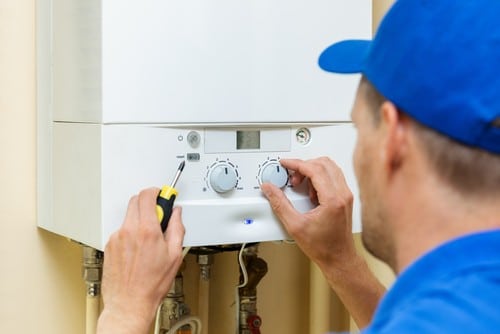Winter is a good time to remind ourselves of the potential risk of carbon monoxide exposure from faulty or unflued gas heaters or other gas devices.
Carbon monoxide spillage
The carbon monoxide is a colourless, odourless and tasteless gas that can be deadly if inhaled. Carbon monoxide (CO) is released from burning fuels such as wood, coal or kerosene. It can also seep out of poorly maintained water heaters, stoves or appliances that use natural gas.
Gas heating appliances must be serviced by specialist plumbers in gasfitting and should be licensed to carry out these works.
Consumers should ask gasfitters for their licence details, and they must provide a compliance certificate for the work.
As part of servicing gas devices, the gasfitter will test for carbon monoxide spillage and negative pressure – two key risks for carbon monoxide poisoning.
If the gasfitter identifies carbon monoxide spillage it must be rectified immediately as exposure can put lives at risk. The appliance may need to be repaired or disconnected.
How carbon monoxide is produced
It can be produced by: incomplete combustion of carbon-based fuels (e.g., wood or carbon-based fuel such as natural gas) due to insufficient oxygen (a mixture of air and carbon-based fuel is required for complete combustion) malfunctioning appliances with an internal source of ignition if exposure to excessive amounts over time, carbon monoxide poisoning will occur.
How can we prevent CO exposure?
In response to a number of poisonings, organisations have produced fact sheets to educate the public on the safe use of gas heaters and on the potential dangers of CO poisoning.
There are some simple ways we can safeguard against CO poisoning:
- have gas heaters (wall units, space units, central heating, gas water heaters) checked every two years by a licensed gas fitter and ask for a Compliance Certificate
- ask for a CO leakage test to be conducted
- ensure there is some fresh air intake periodically in your home
- don’t use a gas heater overnight or for extended periods
- minimise the use of exhaust fans at the same time heaters are used. Using exhaust fans in the kitchen or bathroom can create negative pressure and lead to gas heater emissions being sucked back into the house rather than allowing them to be exhausted to the outside air
- consider installing a CO alarm as an additional safety measure
- do not use an unflued heater in a bedroom and minimise daily usage of unflued heaters
- consider replacing old heaters.
Fixing a negative pressure situation
Negative pressure situations can be fixed by ensuring ventilation openings in your home or building are clear (older homes can have flywire mesh behind the vents) and, where necessary, installing additional ventilation. Your gasfitter should be able to carry out the work required. If the gasfitter finds carbon monoxide in any significant concentration, they should inform you and take appropriate action.
Never run gas devices indoors for heating or cooking if you suspect carbon monoxide exposure is occurring. If gas devices need to be used indoors, and carbon monoxide exposures are suspected to be present, carbon monoxide detectors must not only be installed but also checked regularly.
How dangerous is CO?
Carbon monoxide poisoning has been dubbed the silent killer because it can kill before having any effect. Carbon monoxide is a colourless, odourless gas that affects brain function resulting in headache, nausea and drowsiness and eventually unconsciousness and death.
What to do when you detect carbon monoxide spillage
If you or someone you’re with develops signs or symptoms of carbon monoxide poisoning — headache, dizziness, nausea, shortness of breath, weakness, confusion — get into fresh air immediately and call 000 emergencies and seek medical help.
Using alternative heating sources
If you are going to use an alternative heating source, make sure it is designed to be used indoors. Gas appliances designed for outdoor use or for another purpose (like a gas oven or gas hotplate), should never be used for heating. Only use approved indoor heaters inside for warmth and have these serviced at least every 2 years by a registered gas fitter. This will ensure emission levels are safe. Leave coals from BBQs, heaters and bonfires outside. They can produce CO even if there is no smoke.
Health Effects
The presence of symptoms from Carbon Monoxide exposure is related to the length and extent of exposure. The most affected organs are those that use the highest levels of oxygen, such as the brain and heart.
The most reported symptoms of acute (short-term) exposure to high levels of Carbon Monoxide include:
- headaches, dizziness, nausea
- metallic taste
- darkened vision
- muscular weakness, incoordination and impaired judgement
- numbed reflexes and reaction times
- sleepiness, collapse and unconsciousness
- increased pulse and breathing
- convulsions
- heart attack or stroke
Protect your Home
Simple carbon monoxide detectors are affordable safety aid for your homes: they sound an alarm when there’s a carbon monoxide leak so you’re spared the danger of remaining in the room when your life could be at risk.


